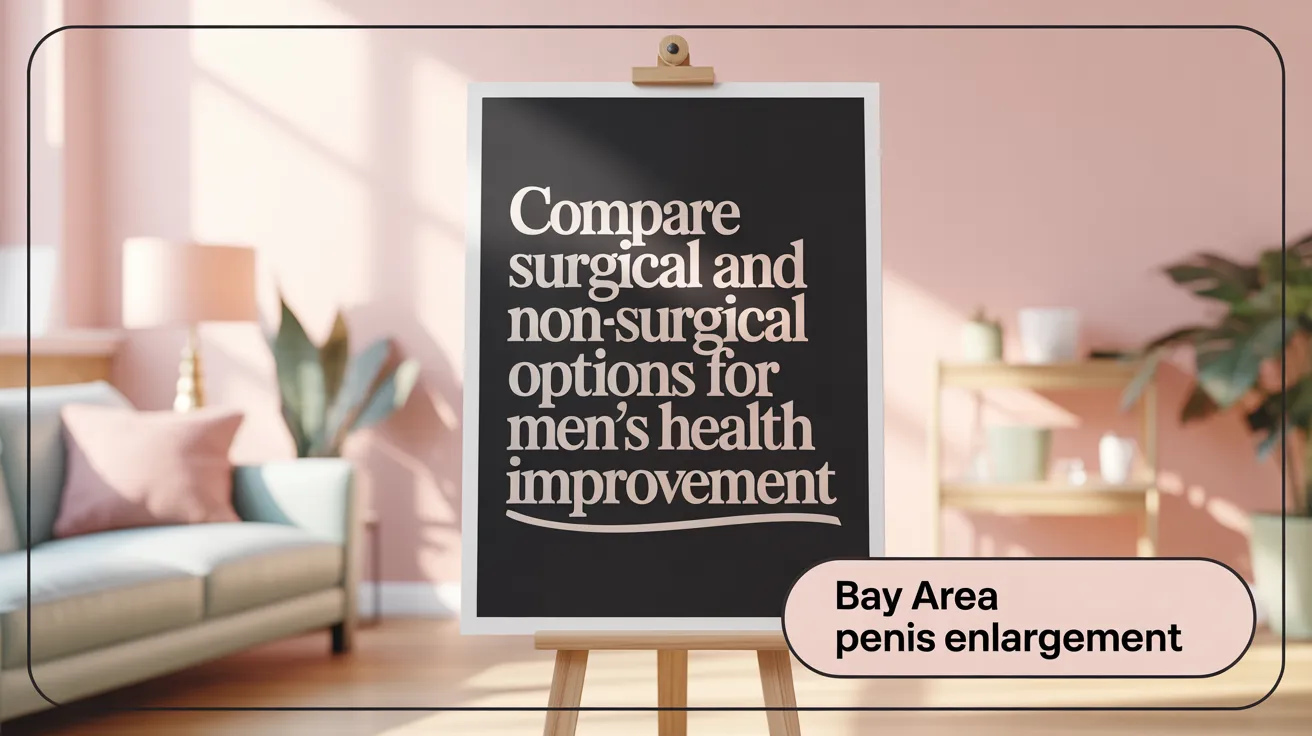Understanding Male Sexual Health and the Drive for Enhancement
Overview of Male Sexual Health
Male sexual health encompasses physical, psychological, and emotional aspects essential for libido, erectile function, ejaculation, and reproductive health. It is influenced by factors such as cardiovascular health, hormone balance, neurological integrity, and mental well-being. Maintaining these domains supports overall sexual wellness and quality of life.
Common Sexual Health Issues in Men
Sexual dysfunction is prevalent, with erectile dysfunction (ED) affecting about 25% to 33% of men, particularly increasing with age and chronic conditions like diabetes, hypertension, and obesity. ED primarily results from vascular issues impairing blood flow but may also arise from hormonal imbalances, nerve injuries, medication side effects, or psychological factors. Low libido, premature ejaculation, and Peyronie's disease also impact male sexual health significantly.
Psychological and Functional Motivations for Enhancement Procedures
Men pursue enhancement for various reasons: those with congenital or acquired abnormalities (e.g., micropenis, buried penis) may seek functional restoration to improve urination and sexual penetration. Many others desire aesthetic improvements driven by concerns over penile size or appearance, often linked to conditions like penile dysmorphophobia or small penis anxiety. These psychological motivations highlight the importance of realistic expectations and mental health evaluation prior to intervention to ensure holistic patient care.
Surgical and Non-Surgical Male Genital Enhancement Options

What are the available surgical and non-surgical options for male genital enhancement?
Male genital enhancement options include both surgical and non-surgical treatments designed to increase penile length, girth, or improve aesthetic appearance. Surgical methods often provide more significant and lasting results but involve higher risks and longer recovery. For a detailed overview of Penis enlargement surgery overview, How penis enlargement surgery works, Pros and cons of penis enlargement surgery, Ligamentolysis procedure, Fat injections for penis enlargement, Dermal filler injections, Penuma® silicone device implantation, Removal of suprapubic fat, Candidates for penis enlargement surgery, Micropenis and buried penis conditions, Restoring function with penis surgery, Body image and penis size concerns, Penile dysmorphophobia (PDD), Small penis anxiety (SPA), Preoperative patient assessments, Health and psychological readiness, Risks of penis enlargement surgery, Potential complications, Benefits of penis enlargement surgery, Improving confidence and self-esteem, please see this resource.
Surgical Procedures for Male Genital Enhancement
Ligamentolysis (Suspensory Ligament Release): This procedure involves cutting the suspensory ligament to increase visible penile length. While it can lengthen the flaccid penis, gains in erect length vary, and complications such as instability or scarring may occur.
Fat Injections and Dermal Fat Grafting: Autologous fat harvested from the patient is injected into the penis to enhance girth. Though results can be natural-looking, drawbacks may include fat resorption, irregularities, or scarring.
Dermal Fillers (Hyaluronic Acid, Polymethyl Methacrylate): Injectable fillers have been shown to safely increase penile girth by several centimeters. Techniques like the UroFill™ provide controlled and durable results.
Penuma® Silicone Implant: The Penuma® device is the only FDA-cleared penile implant designed to augment girth and shape, made from soft silicone. It provides durable enhancement but carries risks such as infection and may require skilled surgical expertise.
Removal of Suprapubic Fat Pad: In cases of buried penis due to excess pubic fat, liposuction or excision of fat can improve penile exposure.
Non-Surgical Treatments
Penile Traction Devices: Scientifically supported to produce gradual penile lengthening by applying continuous traction. Gains are modest and take months to achieve.
Vacuum Erection Devices: Primarily used for erectile dysfunction, they create temporary swelling and enlargement of the penis but do not provide permanent size increases.
Injectable Fillers: Minimally invasive filler injections to the penis can improve girth and shape. However, their efficacy is generally limited to girth enhancement and require medical oversight.
Other Methods: Topical creams, weights, or exercises like jelqing lack strong evidence and may pose safety risks. For safe and effective methods, consult sources such as The STUD Protocol for Men's Sexual Health.
Risks and Benefits
Surgical enhancements can significantly improve penile size and patient confidence but carry risks including infection, scarring, loss of penile sensation, erectile dysfunction, and dissatisfaction with cosmetic outcomes. Recovery can range from a few weeks to six weeks depending on the procedure. Visit Risks of penis enlargement surgery for comprehensive information.
Non-surgical options usually involve lower risk and downtime but offer more modest and sometimes temporary results. Lifestyle changes and other therapies also support sexual function (see Six lifestyle changes to improve male sexual health).
Patient Selection and Psychological Assessment
Ideal candidates are thoroughly evaluated for physical health, psychological readiness, and realistic expectations. Conditions such as micropenis or buried penis due to congenital or acquired factors may necessitate surgery for functional restoration. Most men seeking cosmetic enhancement should undergo mental health evaluation to rule out body dysmorphic disorders and ensure informed decisions.
Personalized treatment plans, often under the care of experts like Dr. Victor Liu, balance safety, efficacy, and patient goals with minimally invasive and advanced surgical techniques.
| Procedure Type | Examples | Benefits |
|---|---|---|
| Surgical | Ligamentolysis, Penuma implant, fat grafting | Longer-lasting size increase, functional correction |
| Non-Surgical | Traction devices, vacuum therapy, injectable fillers | Lower risk, minimal downtime, modest improvements |
| Psychological Care | Mental health screening, counseling | Ensures realistic expectations, addresses body image issues |
Comprehensive Treatments for Erectile Dysfunction at Specialized Clinics

Causes and prevalence of ED
Erectile dysfunction (ED) is a common condition characterized by the inability to achieve or maintain an erection sufficient for sexual intercourse. It affects about 40% of men by age 40, increasing to 70% by age 70. ED is frequently caused by vascular problems limiting blood flow, nervous system disorders, hormonal imbalances, psychological factors, and medication side effects. Chronic conditions such as diabetes, hypertension, and cardiovascular disease significantly contribute to its prevalence. For more detailed information, see Erectile Dysfunction Causes and Erectile dysfunction overview.
Diagnostic approaches including color Doppler ultrasound
Specialized clinics perform a thorough assessment of ED, including detailed medical and sexual histories, physical examinations, and laboratory tests for hormone levels. Color Doppler ultrasound is a valuable diagnostic tool used to evaluate penile blood flow and vascular health, helping to identify vascular causes of ED. This imaging aids clinicians in tailoring treatment strategies and determining the suitability of different interventions. Additional insights on diagnostics and personalized treatment are provided in ED Diagnostic Tests and Diagnosis of Erectile Dysfunction.
Range of treatment options: oral medications, injections, vacuum devices, implants
Treatment at specialized male sexual health clinics is highly individualized. First-line therapies include oral phosphodiesterase type 5 inhibitors (PDE5i) such as sildenafil, tadalafil, and vardenafil, which enhance nitric oxide effects to promote penile blood vessel relaxation and erections. See Oral Medications for ED and Treatment Options for ED.
For patients unresponsive or contraindicated for oral agents, other modalities include:
- Penile injections delivering vasoactive agents directly
- Urethral suppositories to induce erections
- Vacuum erection devices that mechanically enhance blood flow
In refractory cases, surgical options like penile prosthesis implants—either inflatable or malleable—are offered, providing reliable and spontaneous erectile function restoration. Microsurgical penile revascularization is another specialized surgical option for select patients. More about these treatments can be found at Devices and Surgery for Erectile Dysfunction and Penile Implants for ED.
Role of lifestyle changes and psychological counseling in ED management
Lifestyle optimization is fundamental in managing ED. Clinics emphasize weight management, smoking cessation, regular cardiovascular exercise, moderation of alcohol intake, and healthy diets to improve vascular health and endothelial function. See Six lifestyle changes to improve male sexual health and Lifestyle factors affecting ED.
Psychological counseling plays a vital role, especially when emotional or relationship issues contribute to ED. Partner involvement and stress reduction techniques are often integrated into treatment plans to improve adherence and outcomes. More information is available at Emotional Support for ED and Counseling for erectile dysfunction.
Together, these approaches in specialized clinics provide a comprehensive, safe, and effective pathway to restore male sexual function and quality of life.
Ensuring Safety and Natural Outcomes in Male Sexual Health Procedures
How does Dr. Victor Liu ensure safety and natural results in male sexual health procedures?
Dr. Victor Liu is a highly experienced board-certified plastic surgeon, double-board certified in General Surgery and Plastic Surgery, with more than 50 years of expertise. His long career includes extensive surgical practice and a reputation for prioritizing patient safety and natural-looking outcomes.
He emphasizes minimally invasive techniques in male sexual health treatments, which reduce risks such as infection and scarring while promoting quicker recovery times. This approach preserves penile function and aesthetics, aiming for results that enhance confidence and maintain natural form.
Personalized treatment planning is central to Dr. Liu’s methodology. Every patient’s unique anatomy, medical history, and enhancement goals are carefully evaluated to tailor procedures specifically suited to their needs. This individualized care ensures that enhancements look harmonious with each patient’s body and function seamlessly.
Moreover, Dr. Liu collaborates closely with urologist Dr. Elliot Lander, integrating advanced regenerative medicine and reconstructive urology techniques. This multidisciplinary teamwork broadens the range of safe, effective options available, from surgical interventions to regenerative therapies.
Lastly, Dr. Liu and his team stress the importance of realistic expectations and psychological support. They assess mental readiness, educate patients thoroughly on possible outcomes and risks, and recommend counseling when appropriate to support healthy self-image and satisfaction with results.
This comprehensive strategy ensures that patients receive safe, effective, and natural-appearing male sexual health enhancements, combining technical precision with compassionate care.
Personalized Treatment Planning for Male Sexual Health Issues
How do specialized clinics customize treatment plans for male sexual health issues?
Specialized clinics customize treatment plans by conducting thorough patient evaluations that encompass detailed medical history, physical examinations, and diagnostic testing such as penile ultrasounds, hormonal profiles, and semen analyses. This comprehensive assessment identifies specific conditions like erectile dysfunction, Peyronie’s disease, hormonal deficiencies, or fertility issues.
Based on these findings, personalized therapeutic approaches are developed. Options may include oral medications such as PDE5 inhibitors, hormone replacement therapies, minimally invasive techniques like Shockwave therapy for erectile dysfunction and Platelet-rich plasma (PRP) injections for male sexual health (P-Shot), or surgical interventions such as Penis enlargement surgery overview or corrective surgeries. The choice depends on the patient’s unique clinical presentation, health status, and treatment goals.
Psychological and relational factors are integral to treatment planning. Clinics often incorporate counseling and mental health support to manage anxiety, depression, or body image concerns such as Penile dysmorphophobia (PDD) that may affect sexual function and overall wellbeing.
Multidisciplinary teamwork involving urologists, plastic surgeons, endocrinologists, and mental health professionals ensures that care is holistic, addressing physical, emotional, and psychosocial dimensions. This coordinated approach optimizes safety, efficacy, and patient satisfaction by aligning interventions with individual needs, expectations, and lifestyle considerations.
Advancements in Minimally Invasive Male Genital Enhancement

What advancements have been made in minimally invasive male genital enhancement procedures?
Minimally invasive male genital enhancement has seen notable progress in recent years, focusing on safety, efficacy, and recovery time. Injectable fillers such as hyaluronic acid and polylactic acid have become popular for increasing penile girth. These fillers provide effective, reversible volume enhancement with minimal side effects, showing girth increases of approximately 2.3 to 3.8 cm and duration lasting many months.
The Penuma® implant represents a significant advancement as the only FDA-approved subcutaneous silicone device designed for penile girth enhancement. This implant offers durable results and high patient satisfaction with comparatively low complication rates. Alongside implants, tissue engineering with biodegradable scaffolds for penile enhancement has emerged. These scaffolds stimulate natural, vascularized tissue growth, offering a promising and reproducible method to safely increase penile girth and restore tissue quality.
Refinements have also been made in non-surgical options. Vacuum erection devices (VEDs) have been optimized to enhance erectile function and temporary size, though long-term enlargement effects remain limited. Penile extenders for enlargement, which apply gentle tension to penile tissue, have gained validation for safely producing modest length gains over time. Platelet-rich plasma (PRP) injections for male sexual health (P-Shot), including protocols like the P-Shot, stimulate tissue regeneration and can improve erectile quality alongside slight size increases.
These minimally invasive approaches share key benefits: shorter recovery periods (often less than 48 hours), fewer risks compared to traditional surgery, and natural appearing results tailored to individual anatomy. By combining advanced injectable materials, implant technology, regenerative medicine, and mechanical therapies, modern enhancements offer effective solutions with improved safety profiles and enhanced patient confidence.
Integrating Lifestyle and Emotional Health in Male Sexual Wellness

How Do Lifestyle Factors Influence Erectile Function and Sexual Performance?
Lifestyle choices play a pivotal role in male sexual health, particularly in erectile function. Healthy blood flow is essential for achieving and maintaining erections, with nitric oxide facilitating relaxation of blood vessels and promoting blood flow into penile tissue. Factors like smoking, obesity, excessive alcohol consumption, and poor diet negatively impact vascular health by increasing reactive oxygen species (ROS) that reduce nitric oxide efficiency, leading to impaired erectile function (Six lifestyle changes to improve male sexual health.
What Effective Strategies Can Men Adopt to Support Sexual Health?
To improve sexual function and performance, several lifestyle modifications are recommended:
- Regular Exercise: Cardiovascular activities such as running or swimming enhance heart health and blood circulation, significantly boosting sexual stamina (Increasing sexual stamina).
- Healthy Diet: A diet rich in fruits, vegetables, complex carbohydrates, omega-3 fatty acids, and vitamin D supports vascular health and reduces the risk of erectile dysfunction (Six lifestyle changes to improve male sexual health.
- Pelvic Floor Exercises: Kegel exercises strengthen muscles involved in sustaining erections (Six lifestyle changes to improve male sexual health.
- Stress Management: Reducing stress through exercise and open communication helps prevent constricted blood vessels and improves erectile quality (Six lifestyle changes to improve male sexual health.
- Avoiding Tobacco and Limiting Alcohol Consumption: These behaviors reduce vascular damage and promote better blood flow (treatment for erectile dysfunction).
What Role Does Psychological Wellbeing and Counseling Play in Sexual Health?
Psychological factors such as anxiety, depression, and stress can contribute significantly to the development or exacerbation of erectile dysfunction. Counseling or therapy addresses these emotional issues and fosters healthier sexual relationships by improving communication with partners. For men experiencing body image concerns related to their genital appearance, psychological evaluation paired with realistic expectations is critical before considering medical or surgical treatments (Aesthetic surgery of the male genitalia; Body image and penis size concerns).
How Can Confidence and Satisfaction Be Enhanced Through Holistic Care?
Integrating lifestyle improvements with psychological support creates a comprehensive approach to male sexual wellness. Such holistic care not only improves physical function but also boosts self-esteem and sexual satisfaction. When men adopt healthier habits, manage stress effectively, and seek professional counseling when needed, they often experience increased confidence and intimacy in relationships, leading to improved quality of life and overall well-being (Benefits of penis enlargement surgery; Male sexual health overview).
The Future of Male Sexual Health Enhancement: Safety, Personalization, and Holistic Care
Integrating Advanced Medical Procedures with Lifestyle and Psychological Support
The future of male sexual health enhancement emphasizes a comprehensive approach combining cutting-edge medical techniques with lifestyle modifications and psychological care. Procedures such as penile injections, regenerative therapies, and minimally invasive surgeries—performed with precision—are complemented by interventions like cardiovascular exercise, stress reduction, and counseling. This synergy optimizes treatment outcomes by addressing vascular health, mental wellbeing, and physical function concurrently.
Expertise of Specialist Surgeons and Clinicians
Specialists like Dr. Victor Liu bring extensive expertise, with decades of experience in plastic and male genital surgery, ensuring patient safety and personalized care. Such professionals tailor treatments to individual needs, balancing aesthetic goals with functional restoration. Their commitment to minimally invasive, evidence-based procedures enhances recovery and satisfaction, reinforcing the significance of choosing qualified surgeons in this evolving field.
Empowering Patients Through Education and Realistic Expectations
Informed decision-making supported by clear communication about risks, benefits, and achievable results is vital. Encouraging realistic expectations helps mitigate postoperative dissatisfaction and supports psychological adjustment. Patients benefit from thorough consultations that explore physical health, psychological readiness, and lifestyle factors, fostering holistic care that advances both sexual health and quality of life.

